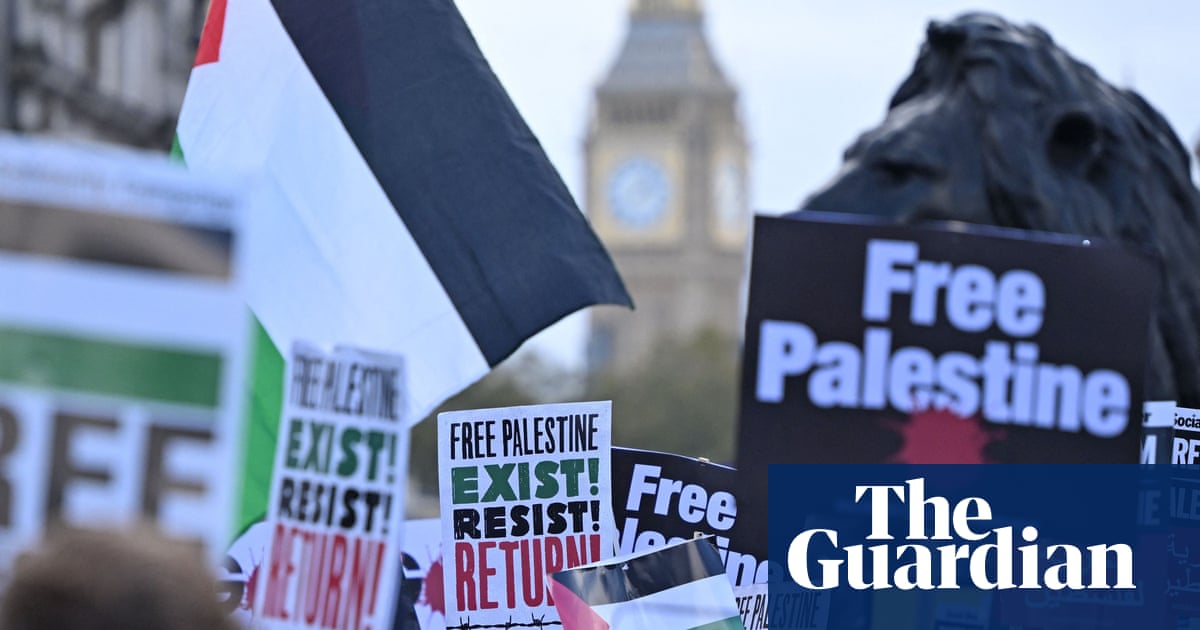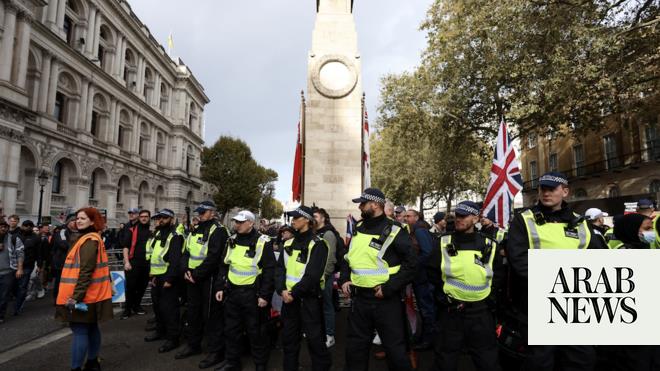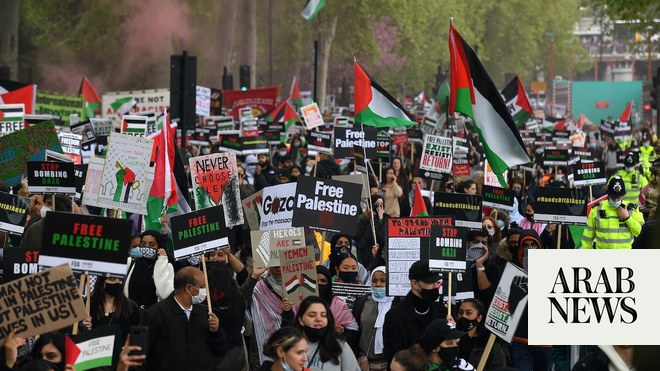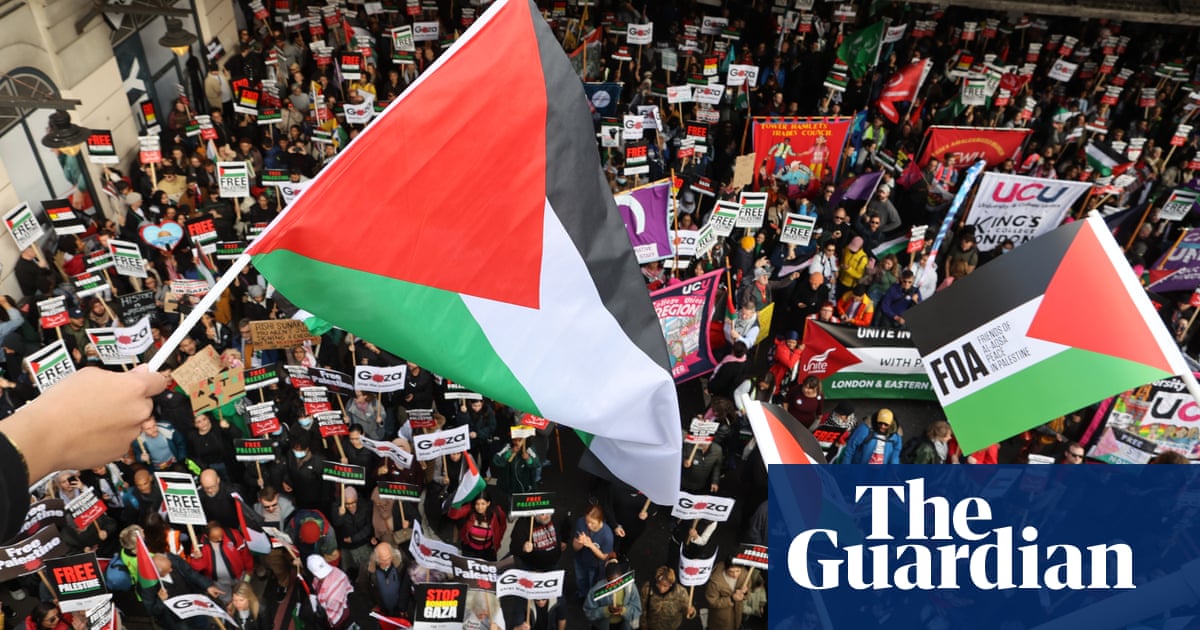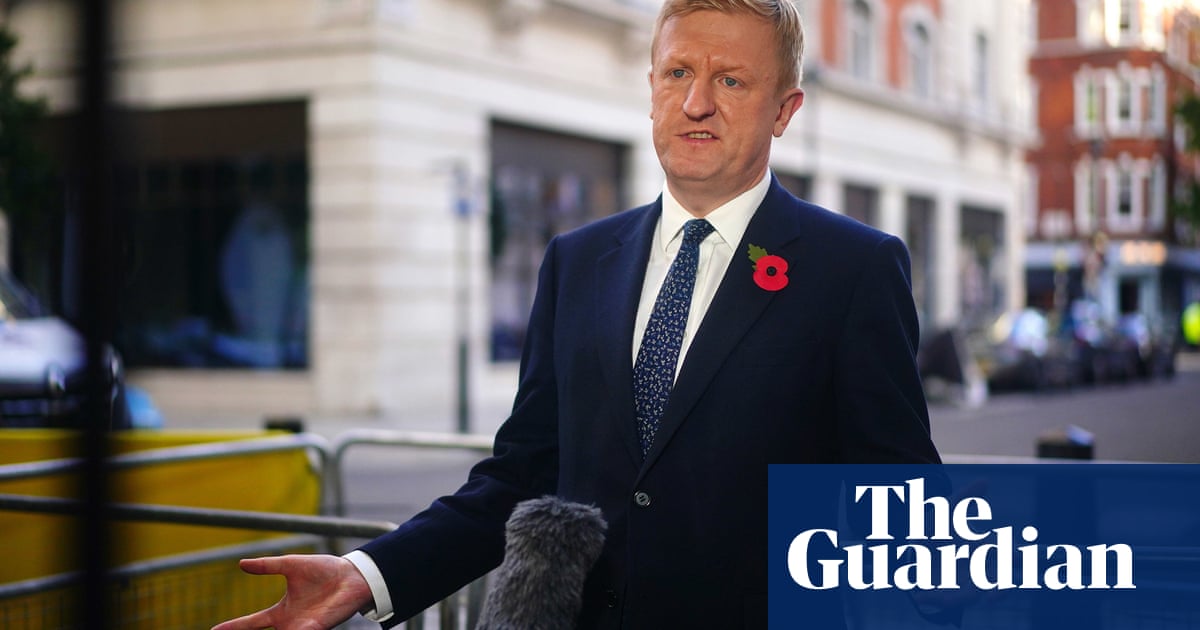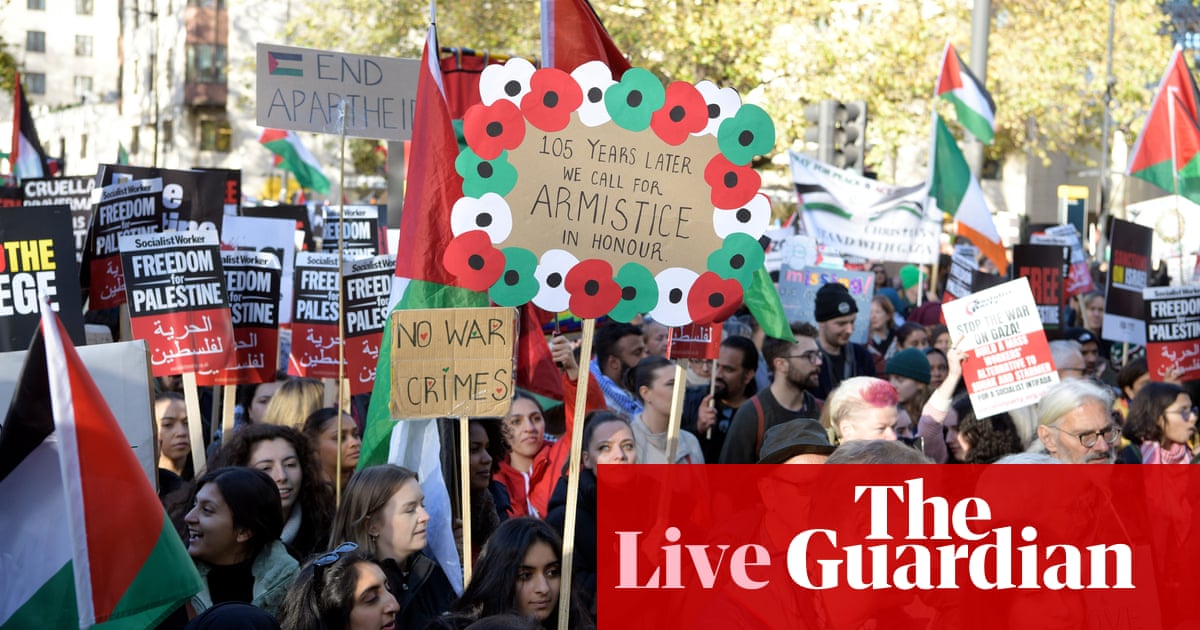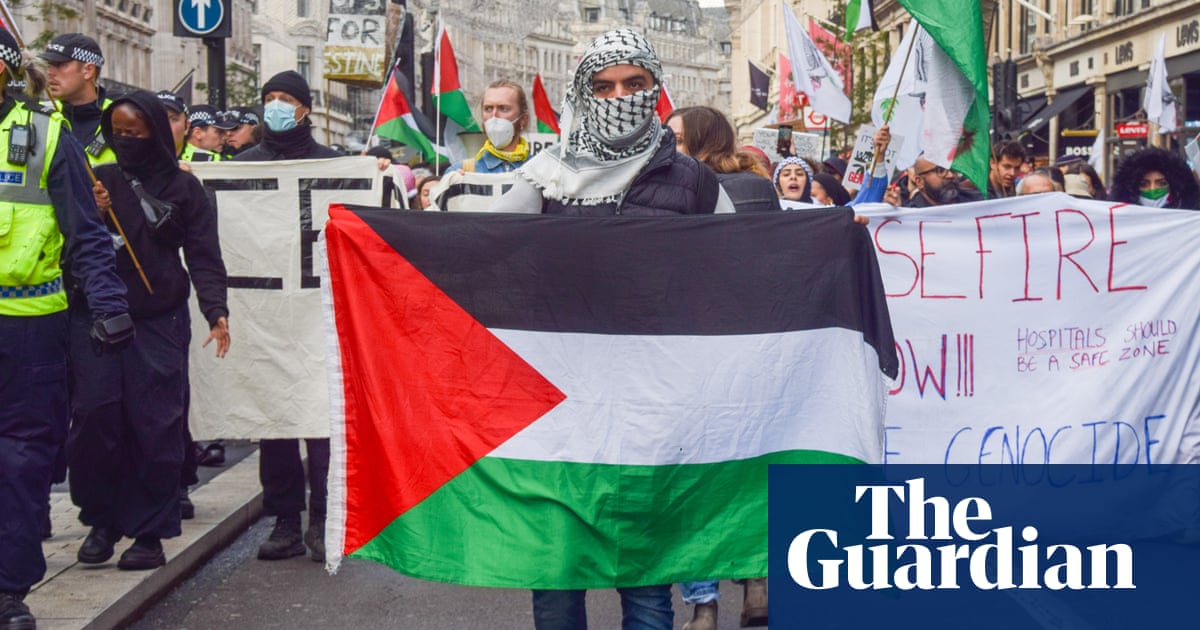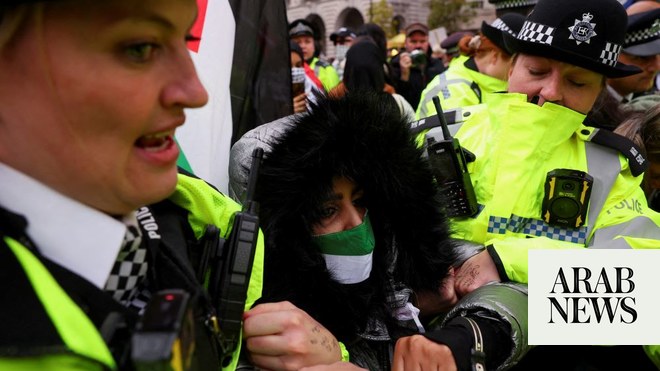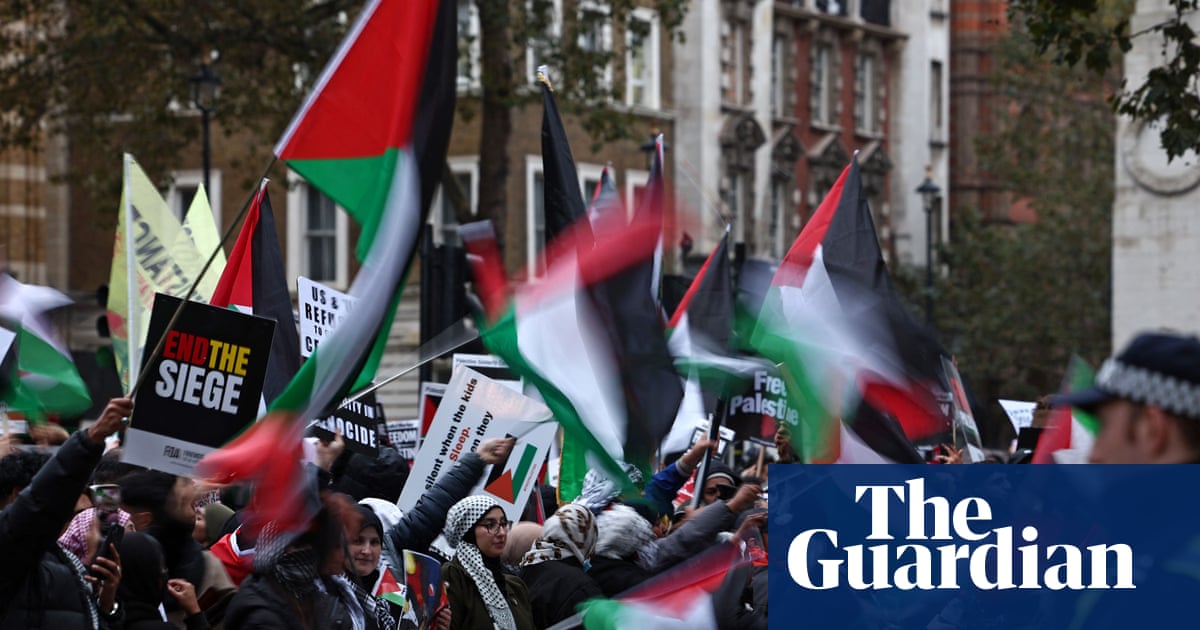
Rishi Sunak has said a major pro-Palestine march will go ahead on Armistice Day and that people have the “right to peacefully protest”, after an emergency meeting with the Metropolitan police commissioner, though he described the plans as “disrespectful”.
After the row over holding the protest on Armistice Day, in which the government piled pressure on the police to stop Saturday’s march in London, Marija Carter, 26, viewed the calls for a ban as somewhat ironic but deeply concerning.
“I am amused and appalled by the insistence that Armistice Day is the wrong time to call for an armistice,” the lawyer in London said. “It would not be the people who died in war who would suffer any offence that hundreds of thousands of free Londoners call for less war.”
Amid a growing schism within Labour over the party’s position on the Israel-Hamas conflict that has seen its shadow levelling up minister resign and 15 other frontbenchers call for a ceasefire or share demands for one, Carter sees a “turning point”.
“It may become the defining moment of our generation. I’m a member of the Labour party because my local branch is wonderful, yet I do not even know if I can make myself vote for Starmer any more, and many of my friends will not. I will probably still do because I’m petrified of another Tory term, but I am completely disillusioned.”
Many will travel to the capital to make their voices heard on Saturday as demands for a ceasefire intensify. Sidra Butt-Mughal, 38, will be making the trip from Oxfordshire with her husband and their two-year-old and five-year-old children to take part. Butt-Mughal, whose brother-in-law is Palestinian American, was one of scores who told the Guardian why they planned to take to the streets on Saturday, saying she felt devastated by the images coming out of Gaza.
“We are a proud British-Muslim family … we feel obligated to voice our concerns about this unjust war,” the research consultant said, adding that it would be the third protest she had attended, including a smaller one in Reading.
“As a mother with very young children, I’m very affected – I imagine all those children, Israeli or Palestinian, to be like my children. I feel it is imperative to add my voice to the millions of British people who are against this war,” she said.
Lydia Samuels, 36, will be attending her fourth Palestine march in recent weeks this weekend, holding homemade placards reading “Jewish and for a free Palestine” and “Jews say ceasefire now”. She characterised her personal experiences at the demonstrations calling for a ceasefire as positive. “People have embraced me enthusiastically and been moved by my presence, often telling me so,” the musician from London said. “Over the last few weeks I see more and more Jews present.”
After Rishi Sunak vowed to hold the Metropolitan police commissioner, Mark Rowley, accountable for refusing to ban the march, Samuels was clear: “It’s Armistice Day, which means ceasefire. It feels perverse to cancel a peace march on a day about peace.”
Samuels was among 200 British Jews who attended a vigil organised by Na’amod UK, a leftwing Jewish organisation that campaigns against the Israeli occupation of Palestinian territory, on Monday. “We observed shloshim, the traditional ceremony of 30 days of mourning. We said prayers and read testimonies and sang songs,” she said of the vigil to remember the 1,400 Israelis killed by Hamas’s attack and the more than 10,000 Palestinians killed by Israel’s response.
While others have been a constant presence at marches, for some, this Saturday will be the first time they have taken part. Jack Rawlinson, 64, a train driver in London, said his participation was motivated in no small part by the government’s attempts to ban it.
“Our home secretary’s attempt to characterise [these demonstrations] as ‘hate marches’, and to associate a clear call for peace and an end to indiscriminate bloodshed with sympathy for terrorism … is despicable, and it is what will get this 64-year-old out on the street for the first time in decades,” Rawlinson said.
He said he was “troubled by the extent to which [Israel’s response] is being defended by pundits and politicians across the political spectrum.”
But some are attending Saturday’s demonstration with a feeling of trepidation. “I am worried about attending the march because I am aware that in the complex and fragmented political environment around this conflict there is a real danger of my statement of protest calling for a ceasefire being unwittingly aligned to, or co-opted by, groups whose objectives I in no way support or endorse,” said Fred Merttens, 46, adding that it would be the first march he has attended since the outbreak of the recent conflict.
Merttens, a policy researcher from Oxford, said he felt wary of bringing his children because he felt there was a “potential risk” of violence on the day, “which is being actively stoked by some of our own politicians and newspapers making inflammatory and divisive remarks”.
But he said this would not stop him from marching. “I simply cannot stand by while my own government does not do everything it can to stop the horrific destruction of Gaza and the lives of the 2.2 million people who live there, half of whom are children,” he said, acknowledging the complexity of a conflict with “no simple solutions”.
He said: “Such peaceful protest is a hard-won democratic right that our current government is doing everything they can to roll back.”




